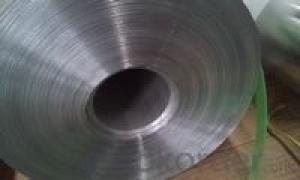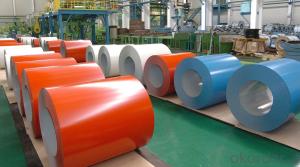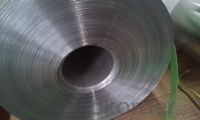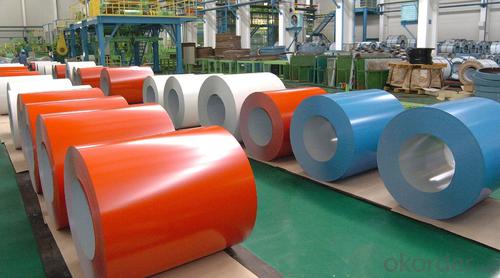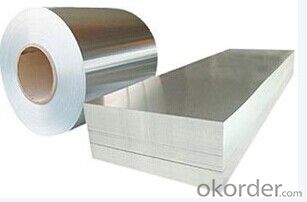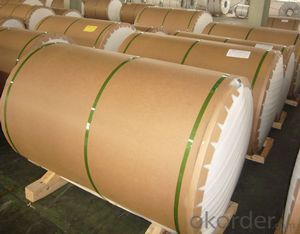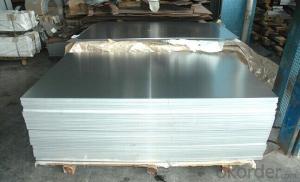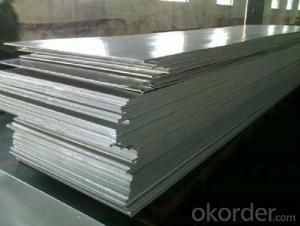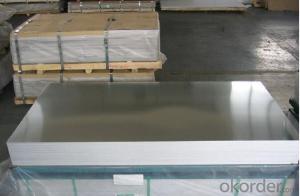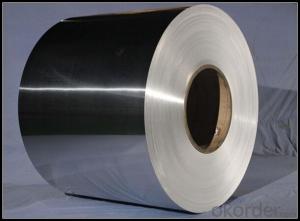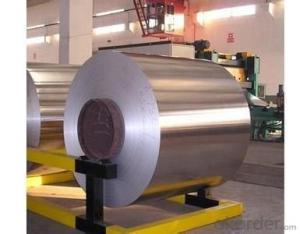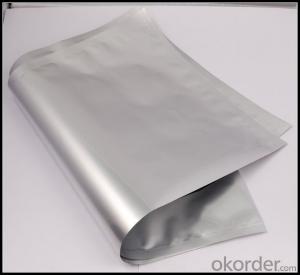1060 Aluminum Coil Price AA1050 Anodising Coated Aluminum Sheet
- Loading Port:
- China Main Port
- Payment Terms:
- TT OR LC
- Min Order Qty:
- -
- Supply Capability:
- -
OKorder Service Pledge
Quality Product, Order Online Tracking, Timely Delivery
OKorder Financial Service
Credit Rating, Credit Services, Credit Purchasing
You Might Also Like
supply Mill-finished / coated aluminum sheet/ coil:
Alloy: AA1050,1060,1100,1200,2024,3003,3304,3005,3015,5052,5086,5754,5083,6061,7050,7475,8011, etc
Temper: O, H14/16/18/22/24/32/ H112/H321/T6,T851,T7451,T7351, etc
Thickness: 0.02mm—20mm
Width: 100mm—2000mm (Can be slitted)
Notice: PE coating / PVDF coating / Embossment can be done if required.
- Q: Can aluminum coils be used in the production of aluminum composite ceilings?
- Aluminum composite ceilings can indeed incorporate aluminum coils. The utilization of aluminum coils as the foundational material for manufacturing aluminum composite panels is quite common. These panels, in turn, serve as the foundation for constructing ceilings. The coils themselves typically consist of high-quality aluminum alloy and have undergone numerous processes to guarantee their durability, strength, and visual appeal. For added protection, the aluminum coils are coated with a layer of either PVDF or polyester. This coating serves to enhance their resistance to weathering, UV rays, and corrosion. Additionally, this protective layer allows for a wide array of color options, thus providing ample flexibility in design choices for aluminum composite ceilings. In summary, aluminum coils play a vital role in the production of aluminum composite ceilings. They offer a lightweight, fire-resistant, and long-lasting solution for a variety of architectural and interior design applications.
- Q: What are the common alloys used in aluminum coil production?
- The common alloys used in aluminum coil production are 3003, 3105, 5052, and 6061.
- Q: What is the role of aluminum coils in the construction of sports stadiums?
- Aluminum coils play a crucial role in the construction of sports stadiums due to their various beneficial properties. First and foremost, aluminum is known for its lightweight nature, making it an ideal choice for large-scale structures like stadiums. The use of aluminum coils in the construction of stadiums allows for easier transportation and installation, reducing construction time and costs. Furthermore, aluminum is highly resistant to corrosion, which is a significant advantage in an outdoor environment where stadiums are often exposed to harsh weather conditions. This corrosion resistance ensures the longevity and durability of the stadium's structure, minimizing maintenance and repair costs over time. Moreover, aluminum coils offer excellent thermal conductivity, meaning they efficiently transfer heat, allowing for effective temperature regulation within the stadium. This is particularly important in modern stadiums that require climate control systems to ensure comfort for both players and spectators. Additionally, aluminum is highly malleable and can be easily formed into various shapes and sizes, allowing for flexibility in the design and construction of stadiums. This versatility allows architects and engineers to create innovative and visually appealing structures, enhancing the overall aesthetic experience for visitors. In summary, the role of aluminum coils in the construction of sports stadiums is multifaceted. They provide a lightweight, corrosion-resistant, thermally conductive, and malleable material that allows for efficient construction, durability, comfort, and aesthetic appeal.
- Q: Can aluminum coils be used in the manufacturing of lighting fixtures?
- Yes, aluminum coils can be used in the manufacturing of lighting fixtures. Aluminum is a versatile and lightweight material that has excellent thermal conductivity properties, making it suitable for dissipating heat generated by the light source. Additionally, aluminum coils are easily moldable, allowing for the creation of intricate designs and shapes in lighting fixtures. The corrosion-resistant nature of aluminum also ensures the longevity and durability of the lighting fixture. Overall, aluminum coils are a popular choice in the manufacturing of lighting fixtures due to their numerous advantages.
- Q: How are aluminum coils used in heating, ventilation, and air conditioning (HVAC) systems?
- Aluminum coils are commonly used in HVAC systems as they serve as heat exchangers. These coils are responsible for transferring heat between the indoor and outdoor units of an HVAC system. The aluminum coils are designed to efficiently absorb heat from the indoor air and release it outside, or vice versa, depending on whether the system is in cooling or heating mode. The use of aluminum coils in HVAC systems ensures better heat transfer, corrosion resistance, and overall system performance.
- Q: Can aluminum coils be used in the production of electronic components?
- Yes, aluminum coils can be used in the production of electronic components. Aluminum is a commonly used material due to its lightweight, conductivity, and corrosion resistance properties. It is often used in electronic devices such as capacitors, inductors, and transformers.
- Q: Can aluminum coils be used in solar energy systems?
- Yes, aluminum coils can be used in solar energy systems. Aluminum is a commonly used material in the construction of solar panels and other components due to its lightweight, corrosion resistance, and excellent thermal conductivity properties. It is often used as a conductor in the wiring of solar panels and can also be found in heat exchangers and solar water heaters.
- Q: Are there any specific certifications or qualifications required for aluminum coil suppliers?
- Yes, there are specific certifications and qualifications that are important for aluminum coil suppliers. One of the key certifications for aluminum coil suppliers is the ISO 9001 certification, which ensures that the supplier has implemented a quality management system and meets the international standards for quality. This certification indicates that the supplier has effective quality control processes, consistent product performance, and customer satisfaction. Another important qualification for aluminum coil suppliers is the AS9100 certification, specifically for suppliers serving aerospace industries. This certification ensures that the supplier has met the quality management system requirements specific to the aerospace industry, including stringent quality control, traceability, and compliance with industry standards. Additionally, aluminum coil suppliers may also need to comply with specific industry standards such as the American Society for Testing and Materials (ASTM) standards or the European Union's REACH regulations for chemical substances. These standards ensure that the supplier's products meet the required specifications and are safe for use in various applications. Furthermore, some aluminum coil suppliers may possess specialized certifications or qualifications related to specific industries or applications. For example, suppliers serving the automotive industry may hold certifications such as the International Automotive Task Force (IATF) 16949 certification, which demonstrates their ability to meet the demanding requirements of automotive manufacturers. Overall, while specific certifications and qualifications may vary depending on the industry and application, aluminum coil suppliers should have certifications such as ISO 9001 and industry-specific certifications to ensure their products meet the required quality standards and comply with relevant regulations.
- Q: What are the dimensions of an aluminum coil?
- The intended use and manufacturing specifications of an aluminum coil can lead to variations in its dimensions. Typical dimensions for an aluminum coil typically fall within a range of 0.2mm to 8mm in thickness and 200mm to 2000mm in width. As for length, it can vary and is usually customized to meet the specific requirements of the customer. Furthermore, the weight of an aluminum coil is subject to change based on its thickness and dimensions.
- Q: How are aluminum coils inspected for surface defects?
- To ensure the production of high-quality and defect-free aluminum coils, a variety of methods are employed to inspect for surface defects. Visual inspection is one commonly used technique, wherein trained inspectors carefully examine the entire surface of the coils for imperfections such as scratches, dents, or unevenness. This inspection takes place in optimal lighting conditions to ensure visibility and accuracy. In addition to visual inspection, more advanced techniques are utilized to detect subtle surface defects. An example of such a method is fluorescent penetrant inspection, where a fluorescent dye is applied to the coil surface. This dye seeps into any surface defects or cracks, and after a certain period of time, the excess dye is removed. The coil is then examined under ultraviolet light, which causes the dye to fluoresce, thereby making any defects easily visible. Another frequently used technique is eddy current testing, a non-destructive method that employs electromagnetic induction to identify defects like cracks or delaminations on the surface of aluminum coils. A probe is passed over the coil surface, and any variations in electrical conductivity caused by defects are detected and analyzed. Furthermore, automated systems equipped with high-resolution cameras and image-processing software can also be utilized for surface inspection. These systems capture detailed images of the coil surface, which are then analyzed by the software based on predefined criteria to identify any defects. This method ensures consistent and objective inspection results. Overall, thorough inspection procedures are implemented to detect and address any surface defects in aluminum coils before further processing or usage. These inspections are vital in maintaining product quality, adhering to industry standards, and ensuring customer satisfaction.
Send your message to us
1060 Aluminum Coil Price AA1050 Anodising Coated Aluminum Sheet
- Loading Port:
- China Main Port
- Payment Terms:
- TT OR LC
- Min Order Qty:
- -
- Supply Capability:
- -
OKorder Service Pledge
Quality Product, Order Online Tracking, Timely Delivery
OKorder Financial Service
Credit Rating, Credit Services, Credit Purchasing
Similar products
Hot products
Hot Searches
Related keywords
